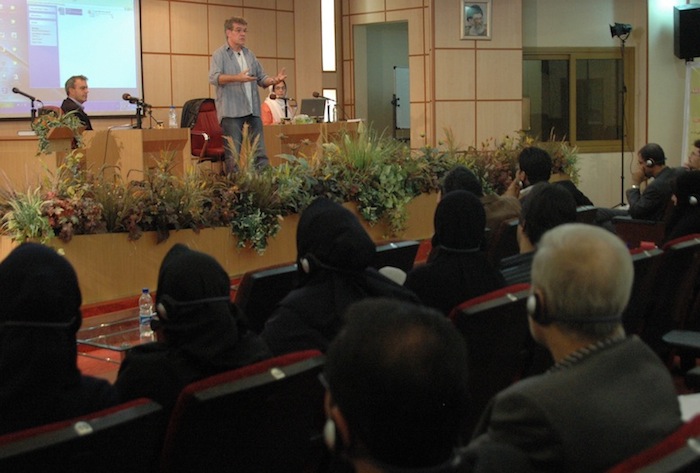This year’s IRIB International Radio Festival in Iran, conducted in association with the Asia Pacific Broadcasting Union (ABU) explored multi-media convergence, digital radio and the place of radio in society.
The conference opened with presentations from Dr Said Reza Ameli and Steve Ahern on the digital world facing broadcasters, and a key note address from Australian radio documentary maker Siobhan McHugh.
Dr Ameli tied the technical elements of mulit-media broadcasting together, pointing out that broadcasters must engage with new forms of transmission and receivers, or be left behind. His focus was on how new media can help society achieve its aims.
“Virtual time and virtual networks” now replace the older linear forms of content delivery according to Dr Ameli, and broadcasters must be aware of how listeners will use time shifting and individual program consumption patterns to consume content in future.
The digital production environment, non-linear editing and personalized reception were three key elements identified by Dr Ameli as key changes facing broadcasters in the new media world.
Steve Ahern reported the latest developments about Australian Digital Radio, explaining that skillful handling of people and industry politics played an important role in achieving that country’s move to digital radio, not just technology. The case study detailed why Australian chose DAB+ and explained the thinking behind using a 128 Kb/sec bit stream for the new transmission technology. Both were good decisions according to Ahern, who says there are now 60 models of DAB+ radio for sale in Australia in over 600 stores.
Siobhan McHugh, well known for her historical radio documentaries, chose to showcase her radio series on the Snowy Hydro scheme as an example of the conference theme, Radio: Medium of Hope and Awareness. The migrant stories from the 1950s, told in McHugh’s documentary, are an example of how radio can create awareness of a changing culture. McHugh believes the medium of radio can be used to spread hope for social improvements through documentaries and features such as the ones she creates.
MiedaCorp Singapore manager Veron Yeo detailed the success of her stations in connecting with audiences through new media, and her colleague Zakiah Halim spoke about the success of various fundraising promotions at MediaCorp, such as a hugely successful cookbook and a series of educational seminars for senior school students.
South Korean KBS producer Lee Jinhee told delegates that Korea is “one of the most wired countries in the world” and that most people “interact, rather than just listen.” Iranian journalist and academic Dr Hamid Ziaei Parvari said there is nearly 13% internet penetration in Iran.
Iranian Dr Ghotbeddin Sadeghi focused on Drama in his presentation, telling delegates that characterization is the most important element in successful drama. The characters must have the essential elements of “a place in society,” must emphasise cultural aspects and reveal their psychological motivations in any well constructed drama. “Radio drama is not based on narrative alone, it is about creating characters in various situations,” he said.
To create great characters, writers must “refer to the hidden features and internal dimensions of the characters to create many layers.” Similar messages were echoed by Radio New Zealand’s Paul Bushnell, who also added advice for radio drama producers, reminding them that an important part of their role is to develop the writer as well as the script.
The ABU’s Vijay Sadhu showcased some award winning prize entries as examples of how radio is changing with the times to continue to capture the interest and imagination of listeners. Masoud AbedinNejad analysed the features of tabloid journalism and offered advice on where populist entertaining journalism may or may not be appropriate in Iranian radio programming.
An engaging discussion over the role of music in Iranian programs dominated the final session, with three well known Iranian musicians debating how much music should be played and where ethnic music should be featured in various program types. Dr Shaahin Farhat made the point that language needs to be translated to be understood, but that music can touch your soul no matter what language you speak. IRIB music specialist Houshand Javid talked about the different ethnic and geographic music of Iran should be properly used in folk programs, and Ali Azari Arghoon analysed policies for using folk music in both community based channels and national programming.
The Festival included a conference, awards of IRIB rizes and an ABU workshop on radio drama (pictured below) presented by Radio New Zealand’s Adam Macaulay and AMT’s Steve Ahern (part owner of this website).


